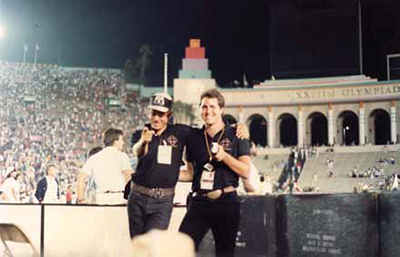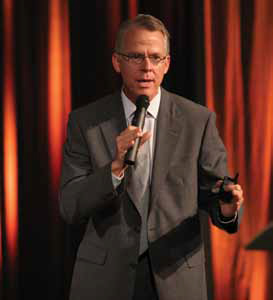Michael MacDonald, president, ATK Audiotek Asked about the arc of his pro audio career, Michael MacDonald went one better. “The arc, drawn on paper, is like a sine wave, and a sine wave, depending on how you look at it, is like a circle,” he described. “You go up, and then you go back down to zero, and then you go to a negative point, and then back up to zero. The circle is there if you’re just stuck in the same point in time, but it’s a sine wave if you calculate time.”
It would be a challenge to find a better analogy for a pro audio career spanning more than three decades, but MacDonald definitely never got stuck in a circle. He began his sine sweep with time spent stationed behind a console and frequently dangling precariously from makeshift PA rigging back in 1978 in his native Southern California. He would return to those hands-on roots in consulting positions interspersed between executive roles at manufacturer juggernauts Yamaha, JBL, and the latter’s parent company, Harman.
The JBL and Harman chapter had two parts, with the first stint a president of JBL ending in 2003, which triggered MacDonald to launch his own consulting business, Pilot Business Strategies (during which time, he was a columnist contributor to SCN). MacDonald then rejoined Harman Professional as vice president of sales and marketing for five years before adding another cycle to the wave in September 2012, when he left Harman to buy into ownership of ATK Audiotek with two partners when then-president Michael Stahl retired. MacDonald now leads ATK alongside fellow partners vice president of special events Mikael Stewart and CTO and vice president of engineering Scott Harmala.
“I think there is a continuum where we reinvent ourselves,” observed MacDonald, sounding invigorated by his current post at ATK Audiotek. “This is a business where you have to have enough confidence in yourself to accept and embrace change.” Those who are insecure will cling to old ways while others are “secure enough to say, ‘Wow, this is something that I need to go back and rediscover, relearn, embrace, and figure out. Because if this many people are talking about it, there’s something going on here that I better know more about and not just try to block it.’”
Such agility is essential in an industry driven by technology, and MacDonald cites several examples of how product trends tend to rise and fall in tandem with one’s course through a career in an industry that seems to perpetually keep all its people. Particularly significant in this regard are line arrays, which MacDonald joked were the “old technology” that he and his cohorts rebelled against when they were just getting their start, and then later embraced following the innovations of Christian Heil in the 1990s.
“One thing that’s a challenge and an opportunity in our business is that technology cycles are really getting faster and faster now,” he noted, pointing out that even the largest evolutionary steps in audio technology from the 1960s to the 1970s would not have required much retraining, but in that same span between the 1980s or 1990s to the present, constant technical training is essential to staying in the game.

MacDonald and Mikael Stewart, now CTO and VP of ATK, at the Closing Ceremonies for the 1984 Olympics. The personal is another key to forward progression in the industry that has enduringly kept MacDonald entertained and challenged. “There’s a certain amount of luck or randomness to getting the opportunity to work on things that give you the insight, skills, and experience to move up to the next level,” he noted, elaborating, “I think that technical skills give you the entrée into the business, but people skills are the key to being successful.”
The source of enthusiasm and confidence for this “new guy” in the business of live sound, touring, and installation is the “marketing guy at my core.” Having spent the better part of two decades working for manufacturers, he approaches challenges with an eye toward maximization of outcome—and he of course finds the right metaphor to make this process appetizing. “No one wants to call themselves a contractor anymore, they say we’re integrators. But I don’t think as a group we’re very good at that, we still think like contractors. What does it mean to be an integrator? It means you have to be creative, you have to solve problems and add value for your customers,” he hypothesizes, pausing, then concluding: “You gotta cook, you gotta be a chef. You have to think about a bunch of different things and how they’re going to get blended together and there’s going to be some harmony in that blending of all those flavors and it creates something that when a person eats it, they think it’s really different, and they want to have more.”
Such creativity and insight does not occur in a vacuum, and MacDonald reciprocates industry accolades and friendships with his own recognition of the many mentors he has sought out from the time he was very young. He’s never stopped learning from mentors, and labels ATK brethren Stewart and Harmala huge influences on a day-to-day basis.
Its that congeniality that has kept MacDonald on the good side of the sine wave for so many years, but he laughs most heartily when he thinks about the “colorful stories” of failure along the way. Then he shares a truth that makes the perfect pithy punchline: “If you’ve never had a couple of big failures in life that you wince at when you think about them, you probably haven’t pushed yourself hard enough to achieve what you could have.”
From the sound of it, the sine-wave arc of MacDonald’s career has definitely been a fun ride, and he’s definitely not going to stop any time soon. Embracing what he calls the adventure of returning to “the same stuff I worked with as a kid” but with a tremendous amount of new variables, he sounds truly thrilled when he declares,
“There’s no sitting still, there’s no down time anymore, because if you’re not doing something, you need to be learning what you’re going to be doing next.”
Kirsten Nelson is the editor of SCN.
